- Home
- Warhammer 40K
Blackshield - Chris Wraight Page 2
Blackshield - Chris Wraight Read online
Page 2
Four hours later, dawn broke. A grimy blush of white against the horizon, barely detectable under the thick layers of vegetation, unravelling a world of drabness and steaming fronds. The land began to rise, at first slowly, then ever more steeply, until they were tramping through winding, boggy defiles choked with spines and arm-length weeds.
Another two hours, and Khorak at last ordered a halt. Towers of glistening rock stood on either side of them, streaked with hanging green creepers. They had reached the neck of a tight-turned gorge, a narrow cleft between tracts of nigh-impassable jungle, screened from above by a rearing cliff and on either side by the rocky towers. Only the way they had come was open, and once they turned their guns would overlook the twisting route below.
‘We stand here,’ Khorak announced, planting his scythe.
The others immediately saw the potential. Turgalla took up position on the left flank, facing down into the bowl of swamp below. Lyphas hunkered down a little further down, half buried in loops of slime. Hesch and Khorak took their places at the narrowest point of the neck, their backs against the rock.
Then they waited, falling perfectly silent, perfectly still. Their armour’s power units cycled down to minimum draw. They rested their weapon barrels on the moist hussocks before them, then made no further move. Condensation ran down their pauldrons, hot and sparkling. Their vox-filters strained softly, in, out, the breathing of the endlessly patient. The world hissed and boiled around them, unquiet in its contagion.
Khorak waited. He drew the metallic air in deeply, feeling its hot scratch against the inside of his lungs. He had not felt that since leaving the home world, and it brought a pang of remembrance.
‘Now let them come,’ he breathed, settling for the wait.
It took the hunters four days to find them. During that time the skies wheeled four times, the world’s weak light slicking over the jungle cover. Khorak’s squad did not so much as lift a trigger finger all the while. Their eyes never left their weapons’ sights; their helms never dropped out of vigilance.
The first detected movement was clumsy, crashing through the foliage a hundred metres deeper down. Khorak watched the hunters come – black-armoured Legion warriors, half-baffled by the smog and poison, their arms heavy with grabbing tendrils. Their movements gave away trace fatigue. They must have been slogging through the mires since the Thunderhawks had dropped them on that first day, and it showed.
‘Wait,’ he voxed softly, letting more of them come into the open.
His own squad was near-invisible by then, covered in the drifting filth of the world, dug-down and semi-buried. His enemy allowed themselves to become exposed, and he studied them. They wore no marker, just black battleplate with all livery blotted. Some marched differently from the others, as if their training or physique were dulled. The formation was loose, their tactics standard. Soon there were twelve of them, climbing ever closer, still advancing in ignorance.
Khorak allowed himself a parched smile.
‘Now,’ he ordered.
Turgalla let fly, sending a rad-missile into the foremost cluster of legionaries. Even before it had hit, Lyphas and Hesch had laid down a supporting wave of bolterfire, blasting through the trunks of hunched trees and sending the creepers snapping like whips. The deluge smashed the foliage apart, driving a corridor of destruction down from the gorge vantage, briefly opening up the defile’s floor to the grey skies.
The black-armoured warriors scattered, some caught in the fusillade and downed before they could return fire, others scrambling for cover. Khorak noted the kill-counter clicking over on his helm-display – eight, nine, ten – and felt a hot flush of vindication. He joined in the slaughter, firing his bolt pistol to add to the carnage, watching as a sprinting legionary’s helm exploded in a puff of crimson.
It was glorious, a loosed riot of slaying to avenge the damage that the hunters had already wrought. More of the enemy, drawn by the clap and ring of mass reactives detonating, surged up from the scabrous mire, making heavy work of the ascent and succumbing to the fate of their brothers. Another brace of them fell, choking in the noxious air as their helm-cables were severed and their faceplates shattered.
So they paid. They paid heavily. But they were yet sons of some primarch, immune to fear and tempered by a lifetime of war. The attackers gauged the cover, gauged the numbers, began to fire back to pin Khorak’s squad down. Flamers opened up, clearing swathes of the jungle and burning back the shroud of foliage that hid their prey. Frag grenades spun out of the firestorm, splintering overhead and raining down incendiary murder. However many warriors were dropped, more emerged, first in twos, then sixes, then nines and tens, forging a bloody path up the defile, marching across the corpses of their downed comrades to get into firing positions.
Turgalla was the first to die, his location obliterated by a combined plasma and lascannon strike that scorched the boggy terrain down to naked stone. Then Lyphas was exposed, taken out by pinpoint bolterfire as he tried to withdraw higher up the defile’s neck. Hesch and Khorak halted the attack for a few moments longer, using their elevation to sow havoc among the advancing legionaries, but then the foremost enemy warriors broke ahead and into blade range.
Hesch swung out his chainsword, launching himself at the first attacker. The two of them traded blows before Hesch was thrown into the air by ranged fire angling up from below, his breastplate torn open before his opponent’s eyes. Striding over, Khorak whipped his crackling scythe blade across, severing the black-plated legionary at the waist and slicing clean through his body. The warrior, cloven in two, collapsed in a fizzing mess of armour-electrics and boiling blood.
Then Khorak, alone now, turned to face the advancing formation, his scythe swimming in disruptor energies, poised to sweep through plate and flesh again. He moved out against the approaching dozens, expecting to feel the first stabs of bolt-impacts across his Terminator armour, anticipating that cleansing pain.
And yet all he faced were shuddering echoes of old discharges.
Twenty metres shy, his pursuers fell back, their weapons trained on him, none opening fire. They slowly formed up in a loose semicircle below him, thin grey vapours curdling around their nightshade armour.
‘What now, brothers?’ Khorak called out in accented Low Gothic, just as he had done in the days when he had had a voice of his own, when the Legions had fought alongside one another rather than as foes. ‘None of you has the stomach to face my blade?’
At that, one of the black-plated warriors moved to the forefront. Like the others, he carried no insignia, but his power armour was heavily modified. Cables snaked around it, bunching thickly where the nodes to the carapace protruded. Glimmers of bare metal gave away the complex outlines of augmetics everywhere – his greaves, cannons, torso.
It looked as if almost all of the matter below his neckline were cybernetic.
Khorak watched him advance until they were barely ten metres apart. The newcomer seemed to be studying him. Khorak held his scythe ready, judging just how far he could punish such presumption.
‘Impossible,’ the legionary said, almost to himself. His voice was a thick cluster of machine-vox timbres, barely human, as deep as a Dreadnought’s rumble. ‘What are you?’
Still Khorak waited. ‘Declare yourself, blackshield,’ he said dryly. ‘I would have your name before I kill you.’
The warrior ignored his demand. ‘You wear the armour and you carry the scythe. Has your master given you leave to have a mind of your own, then?’
Khorak listened carefully. The warrior spoke with a strange inflection, but there was something else. The dour snag of Barbaran rhythms, perhaps? This one evidently knew what Khorak was, and why it was unthinkable that he should be on Agarvian alone.
‘I always had a mind,’ he replied, ‘but not always a tongue. I took it back, and it has served me well. I ask again, and will not do so a third time – give me your name.’
The warrior reached up and, awkwardly, grabbed his go
rget seal and twisted the helm free. The hiss of escaping atmosphere was tinged with green, and boiled away like steam. When it cleared, the face revealed was a mess of scabs and scars, knitted together with metal pins that threaded through hollow cheeks.
He could breathe. He could process the sickened air and still stand steady. So surely he was Death Guard under all that ebon plate, one of the old Legion yet?
‘I am named Crysos Morturg,’ the warrior announced, without pride. Free of the vox-grille’s distortion his accent was neither of Terra nor Barbarus. ‘I once led Destroyers to war under the Fourteenth Legion’s banner. Perhaps you saw me do so on Isstvan Three. Or perhaps you turned your face away on that day, unable to bear the shame.’
So that was it. These hunters were not led by one of the loyal Legions at all, but the disloyal dregs of a disloyal muster, the unworthy and the backward-looking, all of whom should have been long-since culled.
‘You were there,’ said Khorak, a little wonderingly. He had seen the orbital barrages, the waves of landings, and found it hard to countenance the idea that anyone could have lived through that, not even the most doggedly stubborn. ‘How did you survive?’
‘Do not be foolish. No one survived.’
Khorak hesitated, then snorted a dry laugh. ‘Yet here you are, hunting us down for revenge. It eases your pain, this, does it?’
But Morturg made no move. ‘I have slain a hundred of my former brothers already,’ he growled. ‘Every time I felt their blood on my gauntlets, my strength grew. And yet you are different. Why are you here, Deathshroud? How can you be here?’
As he listened, a faint, terrible hope kindled in Khorak’s mind. They were battle-brothers of a kind still, the two of them, sundered only by time and temperament. Perhaps that hope was unworthy, a last strand of weakness, but it would not quite die within him.
‘What I was, I no longer am,’ Khorak said. ‘I watched the killing plains of Isstvan, and I never turned my face away, for all who perished there deserved to die, at least as I thought then. And so I remained under the shadow of our master, as his guardian elect, and I followed him into the void, and we began to burn the Imperium from within.’
He paused, thinking back to his second treachery. That had been the harder of the two.
‘But then came Molech. You know of Molech? Maybe even you will have heard of it. The things I saw there… The dead raised and the living slain. My own brotherhood, sacrificed in a ritual of blasphemy to raise an abomination. And on that day I saw that all our master had ever taught us, all the screeds against the witch and the magicks of Old Night, were as nothing. And if his vows had come to naught, what use were mine?’ He raised one gauntlet to his chest in salute, just as he had done from the earliest days of his fealty. ‘So I took my name back. I found my voice once more. Now I have no master, and all swords are turned against me.’
Morturg looked sceptical. ‘You still wear the colours.’
‘Mortarion changed, I did not. I am still of Barbarus.’
Slowly, as if comprehending a subtle truth, Morturg nodded. ‘And you would kill our father, were you to see him again?’
‘In a heartbeat.’
‘And that is your intention, to find a way?’
‘It is all I live for.’
There was no use for lies now, all knew that. Khorak spoke not to preserve his life, but to state the truth, and this Crysos Morturg could see it. Even so, the hope nagged at him, a fragile skein of possibility, barely more than gossamer-thin.
We want the same thing.
Still Morturg did not move. His warriors kept their bolters trained tight, tracking for the merest hint of treachery. The blackshield’s brow knitted in concentration, a snarl of ruined flesh over steel. He was considering where all this might lead.
Then a sharp clank of ceramite broke the silence. A metre away, Hesch half-rose from the mire, his gun-arm dripping, his helm snaking with electric slivers. He crawled forward, the mouth of his gun smoking, deranged by pain and only seeing enemies. He fired a single time before the chorus of bolter-fire ended him truly, his last shot aimed true, a strike at Morturg’s helm.
Khorak whirled around, trying to interpose his scythe blade between the racing shell and its target, but that was beyond even his skill. Hesch’s shot punched deep into Morturg’s forehead, where it burrowed into the flesh and splintered the bone apart.
Except that it didn’t. That was what it ought to have done.
The bolt crackled into nothing, forced back from the warrior’s skin like a bubble under water, thrown aside, the casing sent flying. Morturg staggered, wincing, and the stink of ozone flowed from his armour. A coil of smoke twisted up across the battered black ceramite, pungent like temple incense.
Khorak knew it instinctively, smelling it, tasting it, remembering the awful betrayal on Molech and all that it had brought. ‘Witchery!’ he hissed.
He whirled, scanning, looking for an external source.
But there was no external source.
Morturg regained his footing, his exposed flesh crawling with pulsing light. Under the weak sun, it seemed as though his outline flickered, momentarily caught between worlds.
‘Make no judgement,’ he warned, snapping back to solidity with a single step towards Khorak. ‘I have no choice in this.’
Khorak withdrew, clutching his scythe defensively. ‘Sorcerer,’ he hissed.
‘Mortarion is gone,’ urged Morturg, keeping his weapon lowered. ‘The old sanctions are gone. Where did they get us?’
But Khorak was no longer listening. He stared at his battle-brother’s scarred face, watching tumours of unnatural light swell beneath it.
How did you survive?
No one survived.
‘You were slain that day,’ Khorak said – an accusation. ‘All were slain.’
Morturg held his gaze, urgent. ‘And I endure still.’
‘Better to die,’ spat Khorak, rekindling his scythe’s blade, ‘than embrace that.’
‘It was only he who taught us such things.’
Khorak laughed, tensing for the first strike. ‘And when he faltered, I forswore him. I retain this, though all else is cast aside – belief. If it is enough to defy the one who made me, why do you think I would suffer the unclean touch in you?’
‘Brother, do not do this.’
But it was too late. His eyes alive with zeal, Khorak raised the scythe and hurled himself towards the psyker before him. It looked for a moment as if Morturg were trying to hold his troops back, to ward off their protective assault, but in the frenzy of movement such gestures were useless. There were over twenty of his warriors present, and they had never let their guard lapse.
Khorak felt the bolter strikes slice through him, shattering his ancient armour into spiralling dagger-edges, burrowing deep into old flesh that had seen the dawn on a hundred worlds. He missed his footing upon the marshy earth, but the bolts kept coming, tearing into him. Morturg cried out, futilely, his armour-edges still licked with the flames of sorcery.
Khorak’s scythe slipped from his fingers just a hand’s width short of the blackshield’s breastplate. He fell to the ground, the filmy waters slapping across his broken armour, mingling with the blood that now pumped heavily from wounds that could never heal.
He choked. He spat clots of black bile, and writhed with the tsunami of pain. He rolled, snake-like in spite of his heavy armour, only to see Morturg towering over him. His ruined face was etched with remorse – a sentinel to watch over the passage into infinity.
‘It should... never have been...’ Khorak gasped, his last breath coming in bloody gouts. ‘You are naught now but... a ghost.’
‘As are you, brother,’ murmured Morturg, bowing his head. ‘As are we all.’
When all was done, when all that could be retrieved – progenoids, restorable weapons, fuel cells from the downed gunships – had been hauled up on lifters, Crysos Morturg’s warband gathered again in high orbit. The strike-cruiser Malice keyed up it
s engines, ready for the long haul to the warp-stages. Deep within the armouries, his troops – some Death Guard still loyal to the Throne, some from the Shattered Legions, others with no clear allegiance at all – repaired their armour and honed their blades.
Morturg himself, in foul humour since the events on Agarvian, remained locked in his tactical chamber, alone save for the hololith that danced before him on the command column. The display showed a set of too-many mechanical limbs emerging from spectral robes – an adept of the Mechanicum, far away, maintaining contact via the signal relay boosters.
‘I had expected to find you in better spirits,’ came the corpse-thin voice of Calleb Decima, the one who had taken the psychically-sustained Morturg from the site of his bodily death and given him the shell of iron he now wore. What existed now was a fused entity, a melded amalgam of unholy tech and biomancy, anathema both to their former masters of Barbarus and Mars. In the years since, Morturg and Decima had worked together in the void, hunting down isolated elements of the XIV Legion wherever they could be found.
‘He was a traitor himself, to all sides,’ said Morturg, moodily. ‘He would have cut the Death Lord’s throat before me, given the chance. What purpose was there in killing such hatred, such conviction? Better to let him live and sow some greater poison, or turn him to our own cause.’
Decima’s mechadendrites scampered over the feed, making the image shiver. ‘You are overcomplicating the matter. His death can only aid the Throne.’
‘Really?’ Morturg adjusted position, wincing as his augmetics bit deep into what remained of his flesh. ‘Now even the old loyalties are gone? Loyalist, traitor – what was he? Both, and neither. We are fracturing out here. He was more blackshield than I, though he never erased his colours.’

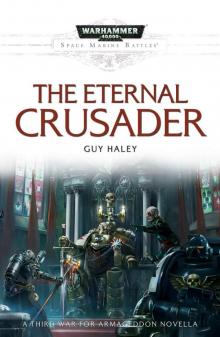 The Eternal Crusader - Guy Haley
The Eternal Crusader - Guy Haley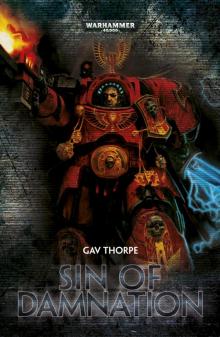 Sin of Damnation - Gav Thorpe
Sin of Damnation - Gav Thorpe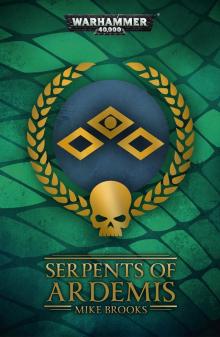 Serpents of Ardemis - Mike Brooks
Serpents of Ardemis - Mike Brooks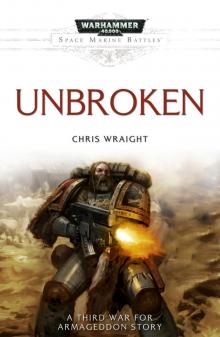 Unbroken - Chris Wraight
Unbroken - Chris Wraight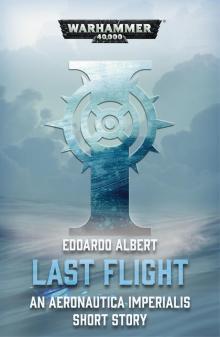 Last Flight - Edoardo Albert
Last Flight - Edoardo Albert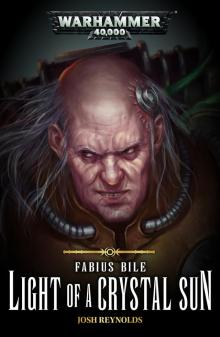 Light of a Crystal Sun - Josh Reynolds
Light of a Crystal Sun - Josh Reynolds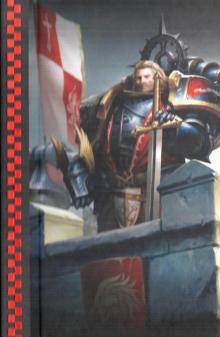 Lion El'Jonson- Lord of the First - David Guymer
Lion El'Jonson- Lord of the First - David Guymer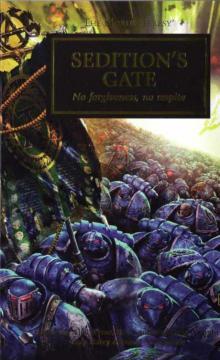 Sedition's Gate - Nick Kyme & Chris Wraight
Sedition's Gate - Nick Kyme & Chris Wraight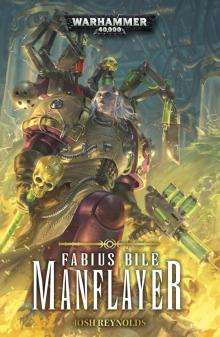 Manflayer - Josh Reynolds
Manflayer - Josh Reynolds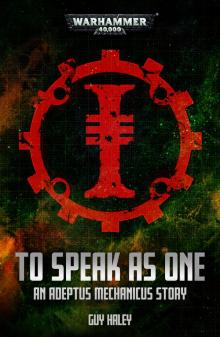 To Speak as One - Guy Haley
To Speak as One - Guy Haley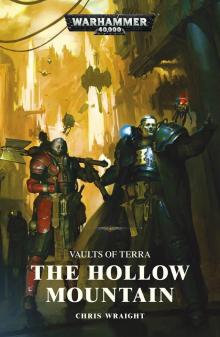 Vaults of Terra- The Hollow Mountain - Chris Wraight
Vaults of Terra- The Hollow Mountain - Chris Wraight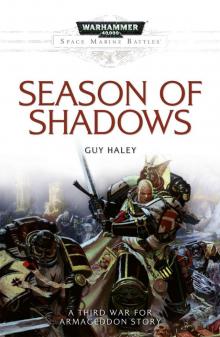 Season of Shadows - Guy Haley
Season of Shadows - Guy Haley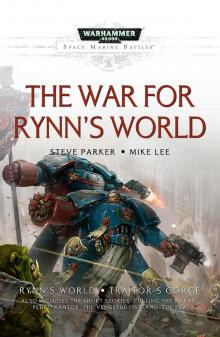 The War for Rynn's World - Steve Parker & Mike Lee
The War for Rynn's World - Steve Parker & Mike Lee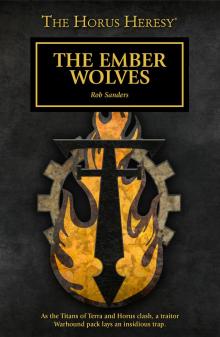 The Ember Wolves - Rob Sanders
The Ember Wolves - Rob Sanders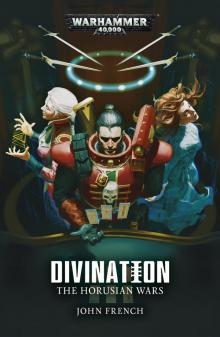 Divination - John French
Divination - John French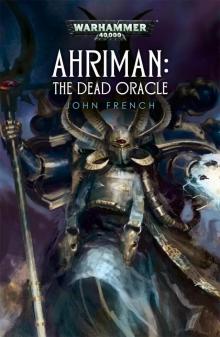 The Dead Oracle - John French
The Dead Oracle - John French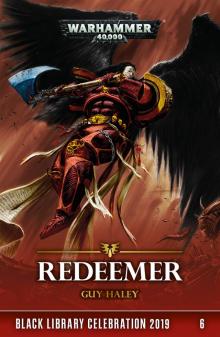 Redeemer - Guy Haley
Redeemer - Guy Haley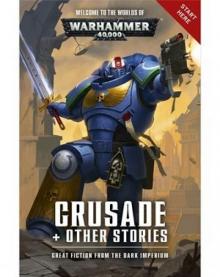 Crusade & Other Stories - Dan Abnett Et Al.
Crusade & Other Stories - Dan Abnett Et Al.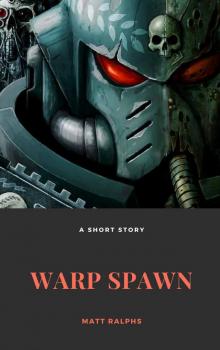 Warp Spawn - Matt Ralphs
Warp Spawn - Matt Ralphs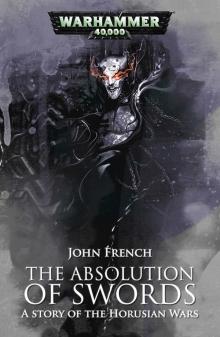 The Absolution of Swords - John French
The Absolution of Swords - John French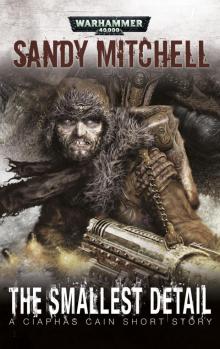 The Smallest Detail - Sandy Mitchell
The Smallest Detail - Sandy Mitchell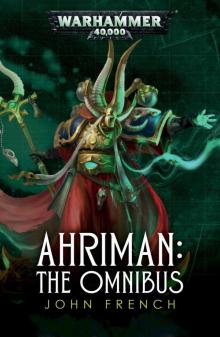 The Omnibus - John French
The Omnibus - John French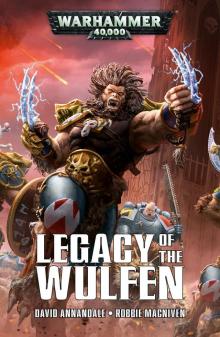 Legacy of the Wulfen - David Annandale & Robbie MacNiven
Legacy of the Wulfen - David Annandale & Robbie MacNiven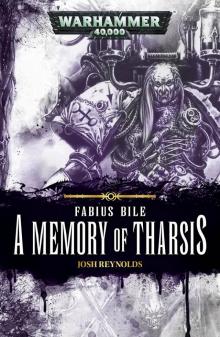 A Memory of Tharsis - Josh Reynolds
A Memory of Tharsis - Josh Reynolds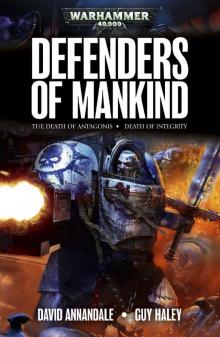 Defenders of Mankind - David Annandale & Guy Haley
Defenders of Mankind - David Annandale & Guy Haley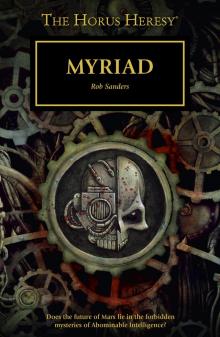 Myriad - Rob Sanders
Myriad - Rob Sanders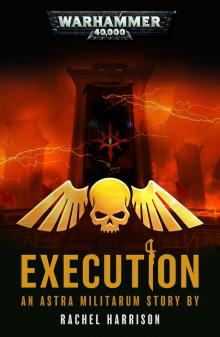 Execution - Rachel Harrison
Execution - Rachel Harrison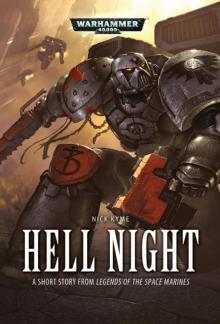 Hell Night - Nick Kyme
Hell Night - Nick Kyme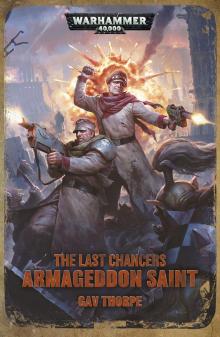 Armageddon Saint - Gav Thorpe
Armageddon Saint - Gav Thorpe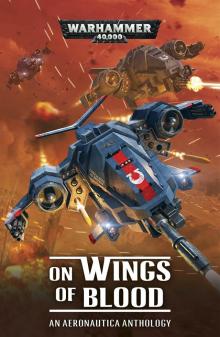 On Wings of Blood
On Wings of Blood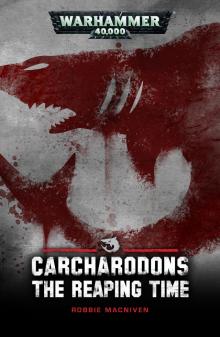 The Reaping Time - Robbie MacNiven
The Reaping Time - Robbie MacNiven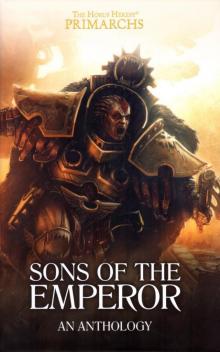 Sons of the Emperor
Sons of the Emperor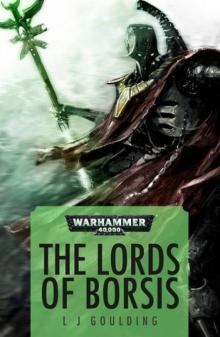 The Lords of Borsis - L J Goulding
The Lords of Borsis - L J Goulding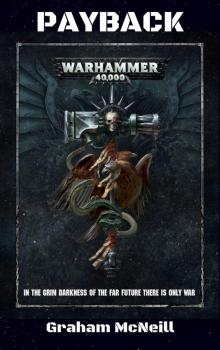 Payback - Graham McNeill
Payback - Graham McNeill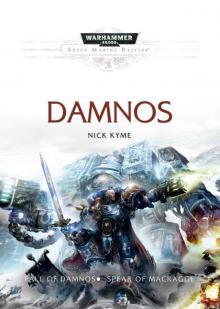 Damnos - Nick Kyme
Damnos - Nick Kyme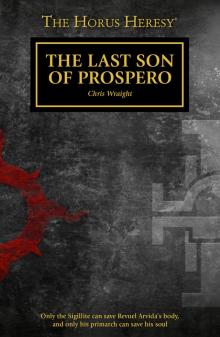 The Last Son of Prospero - Chris Wraight
The Last Son of Prospero - Chris Wraight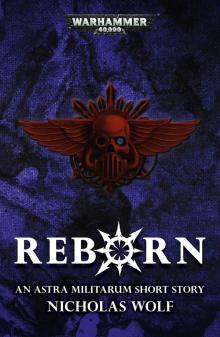 Reborn - Nicholas Wolf
Reborn - Nicholas Wolf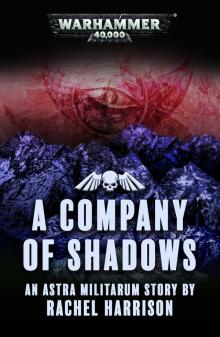 A Company of Shadows - Rachel Harrison
A Company of Shadows - Rachel Harrison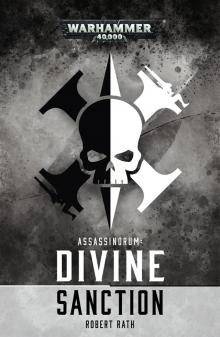 Assassinorum- Divine Sanction - Robert Rath
Assassinorum- Divine Sanction - Robert Rath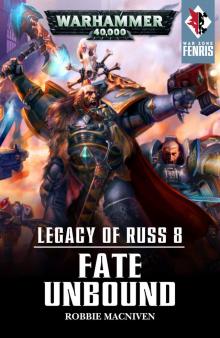 Fate Unbound - Robbie MacNiven
Fate Unbound - Robbie MacNiven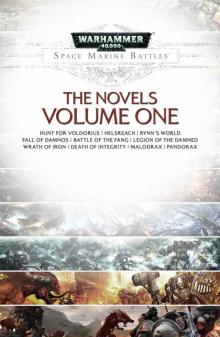 Space Marine Battles - the Novels Volume 1
Space Marine Battles - the Novels Volume 1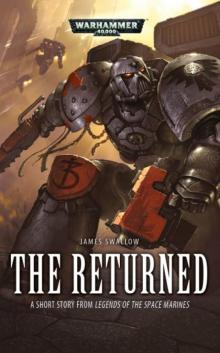 The Returned - James Swallow
The Returned - James Swallow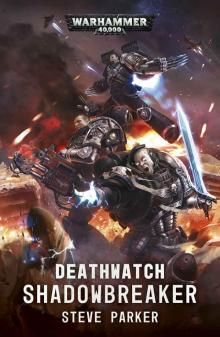 Shadowbreaker - Steve Parker
Shadowbreaker - Steve Parker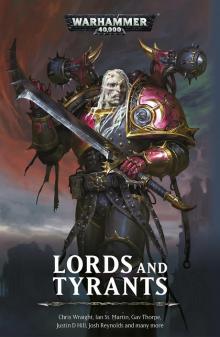 Lords and Tyrants
Lords and Tyrants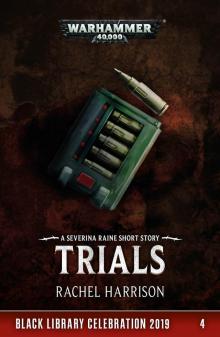 Trials - Rachel Harrison
Trials - Rachel Harrison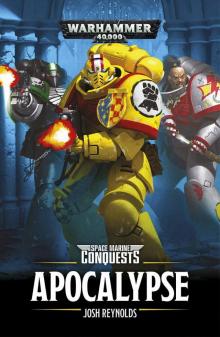 Apocalypse - Josh Reynolds
Apocalypse - Josh Reynolds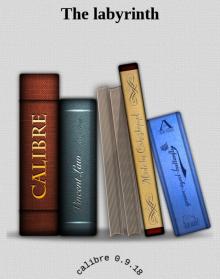 The labyrinth - Richard Ford
The labyrinth - Richard Ford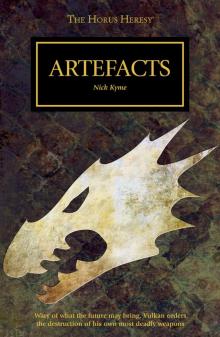 Artefacts - Nick Kyme
Artefacts - Nick Kyme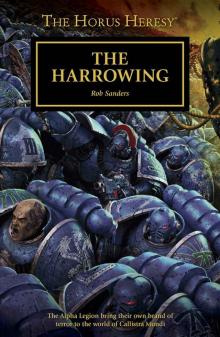 The Harrowing - Rob Sanders
The Harrowing - Rob Sanders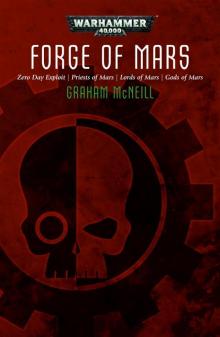 Forge of Mars - Graham McNeill
Forge of Mars - Graham McNeill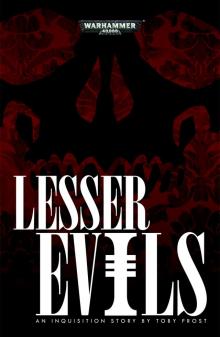 Lesser Evils - Toby Frost
Lesser Evils - Toby Frost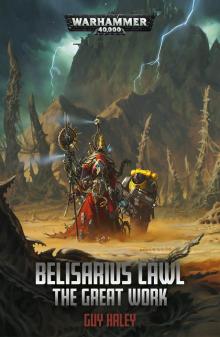 Belisarius Cawl- the Great Work - Guy Haley
Belisarius Cawl- the Great Work - Guy Haley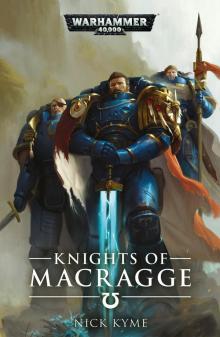 Knights of Macragge - Nick Kyme
Knights of Macragge - Nick Kyme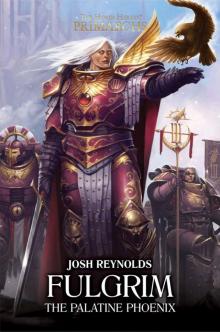 Fulgrim- The Palatine Phoenix - Josh Reynolds
Fulgrim- The Palatine Phoenix - Josh Reynolds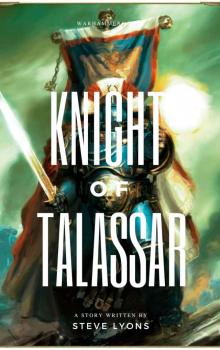 Knight of Talassar - Steve Lyons
Knight of Talassar - Steve Lyons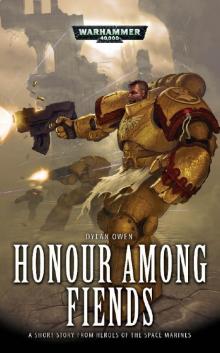 Honour Among Fiends - Dylan Owen
Honour Among Fiends - Dylan Owen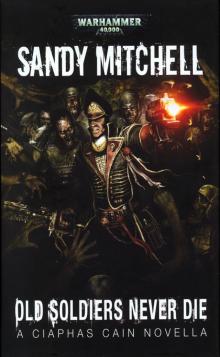 Old Soldiers Never Die - Sandy Mitchell
Old Soldiers Never Die - Sandy Mitchell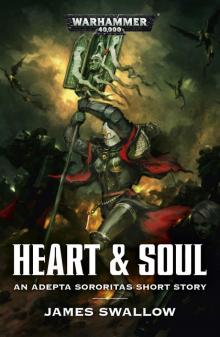 Heart & Soul - James Swallow
Heart & Soul - James Swallow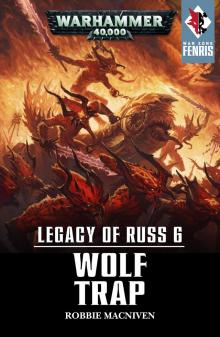 Wolf Trap - Robbie MacNiven
Wolf Trap - Robbie MacNiven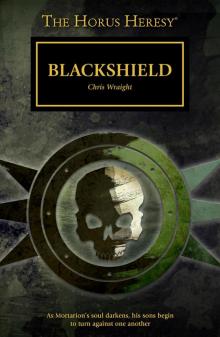 Blackshield - Chris Wraight
Blackshield - Chris Wraight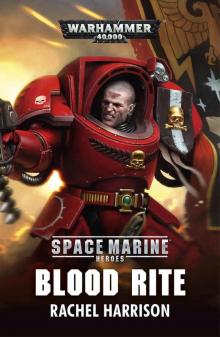 Blood Rite - Rachel Harrison
Blood Rite - Rachel Harrison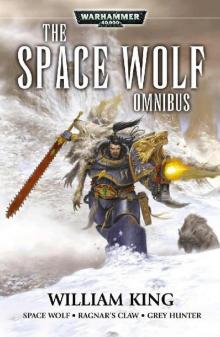 The Space Wolf Omnibus - William King
The Space Wolf Omnibus - William King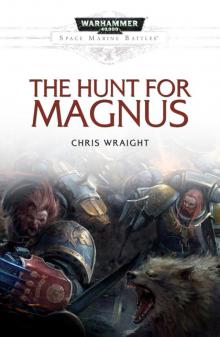 The Hunt for Magnus - Chris Wraight
The Hunt for Magnus - Chris Wraight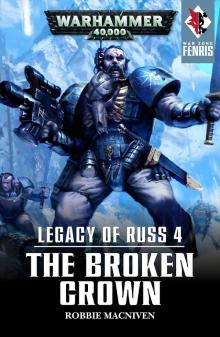 The Broken Crown - Robbie MacNiven
The Broken Crown - Robbie MacNiven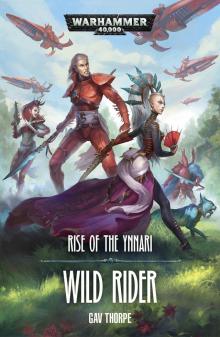 Wild Rider - Gav Thorpe
Wild Rider - Gav Thorpe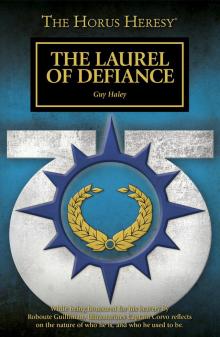 The Laurel of Defiance - Guy Haley
The Laurel of Defiance - Guy Haley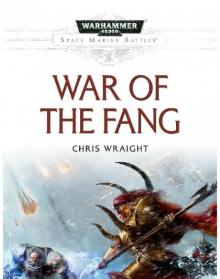 War of the Fang - Chris Wraight
War of the Fang - Chris Wraight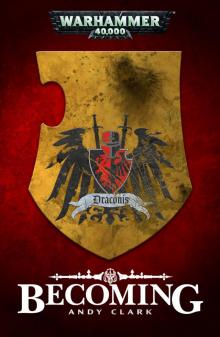 Becoming - Andy Clark
Becoming - Andy Clark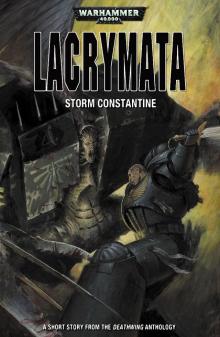 Lacrymata - Storm Constantine
Lacrymata - Storm Constantine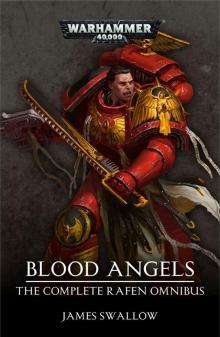 Blood Angels - The Complete Rafen Omnibus - James Swallow
Blood Angels - The Complete Rafen Omnibus - James Swallow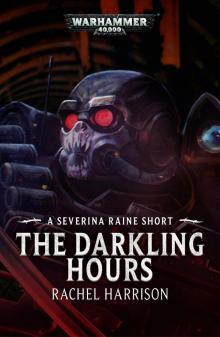 The Darkling Hours - Rachel Harrison
The Darkling Hours - Rachel Harrison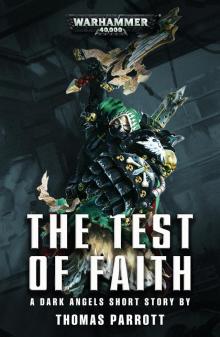 The Test of Faith - Thomas Parrott
The Test of Faith - Thomas Parrott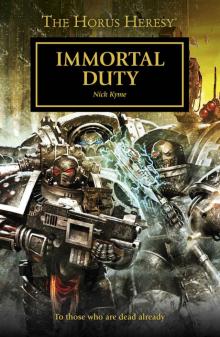 Immortal Duty - Nick Kyme
Immortal Duty - Nick Kyme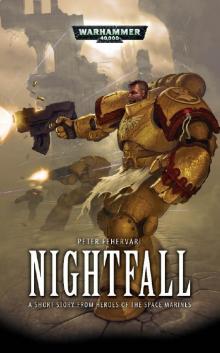 Nightfall - Peter Fehervari
Nightfall - Peter Fehervari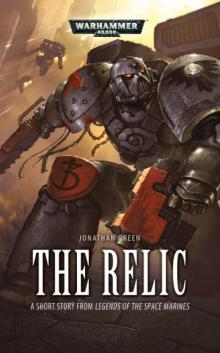 The Relic - Jonathan Green
The Relic - Jonathan Green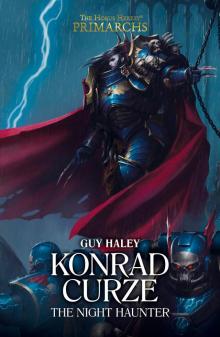 Konrad Curze the Night Haunter - Guy Haley
Konrad Curze the Night Haunter - Guy Haley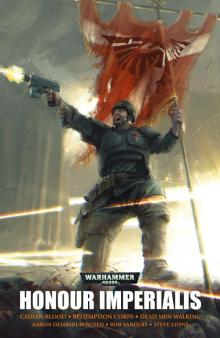 Honour Imperialis - Aaron Dembski-Bowden
Honour Imperialis - Aaron Dembski-Bowden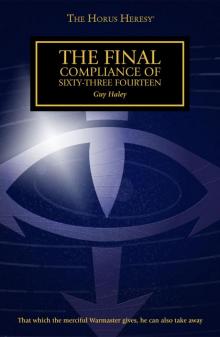 The Final Compliance of Sixty-Three Fourteen - Guy Haley
The Final Compliance of Sixty-Three Fourteen - Guy Haley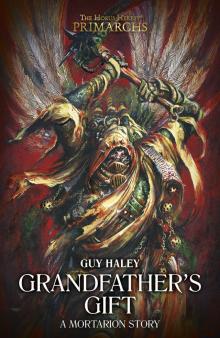 Grandfather’s Gift - Guy Haley
Grandfather’s Gift - Guy Haley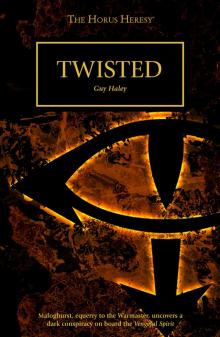 Twisted - Guy Haley
Twisted - Guy Haley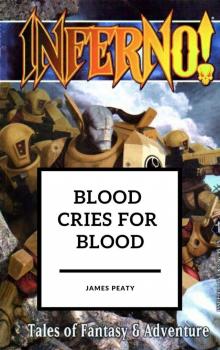 Blood Cries for Blood - James Peaty
Blood Cries for Blood - James Peaty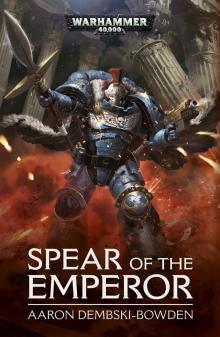 Spear of the Emperor - Aaron Dembski-Bowden
Spear of the Emperor - Aaron Dembski-Bowden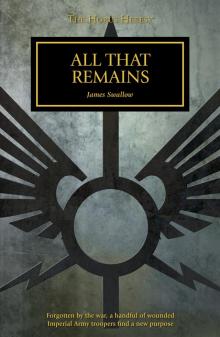 All That Remains - James Swallow
All That Remains - James Swallow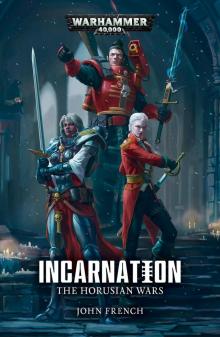 Incarnation - John French
Incarnation - John French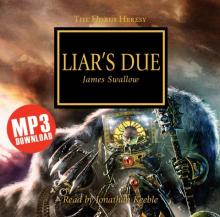 Liar's Due - Ben Swallow
Liar's Due - Ben Swallow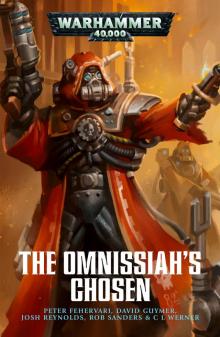 The Omnissiah's Chosen - Peter Fehervari
The Omnissiah's Chosen - Peter Fehervari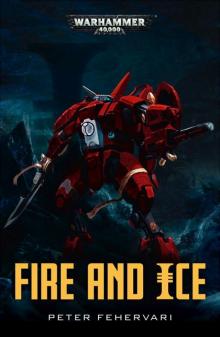 Fire and Ice - Peter Fehervari
Fire and Ice - Peter Fehervari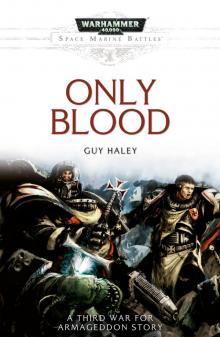 Only Blood - Guy Haley
Only Blood - Guy Haley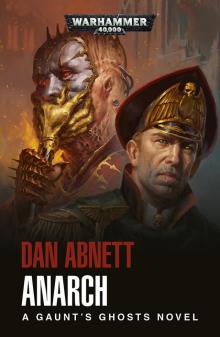 Anarch - Dan Abnett
Anarch - Dan Abnett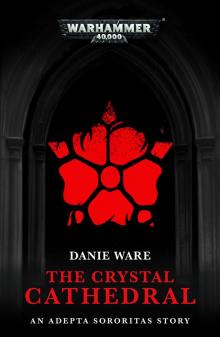 The Crystal Cathedral - Danie Ware
The Crystal Cathedral - Danie Ware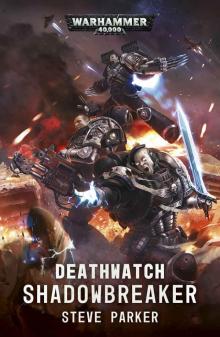 Shadowbreaker
Shadowbreaker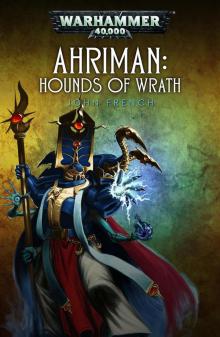 Hounds of Wrath - John French
Hounds of Wrath - John French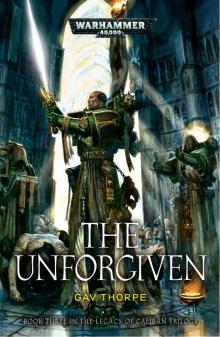 The Unforgiven - Gav Thorpe
The Unforgiven - Gav Thorpe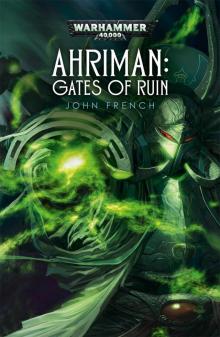 Gates of Ruin - John French
Gates of Ruin - John French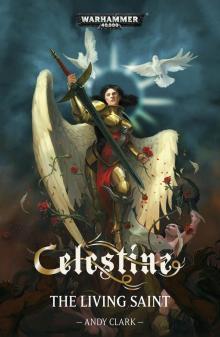 Celestine - Andy Clark
Celestine - Andy Clark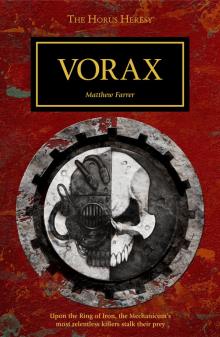 Vorax - Matthew Farrer
Vorax - Matthew Farrer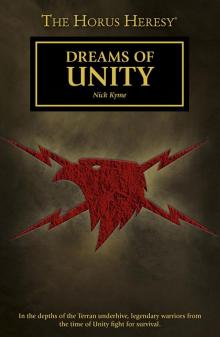 Dreams of Unity - Nick Kyme
Dreams of Unity - Nick Kyme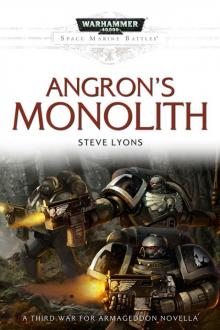 Angron's Monolith - Steve Lyons
Angron's Monolith - Steve Lyons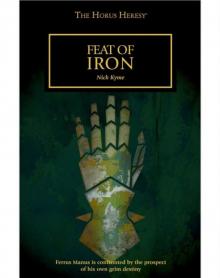 Feat of Iron - Nick Kyme
Feat of Iron - Nick Kyme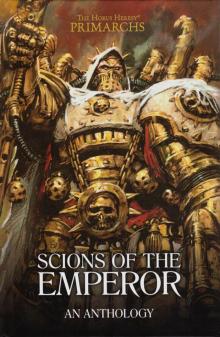 Scions of the Emperor
Scions of the Emperor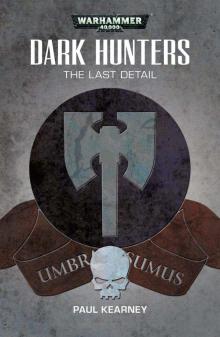 The Last Detail - Paul Kearney
The Last Detail - Paul Kearney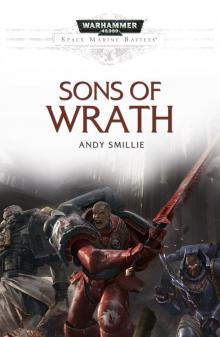 Sons of Wrath - Andy Smillie
Sons of Wrath - Andy Smillie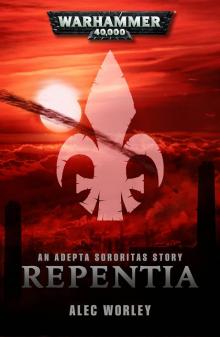 Repentia - Alec Worley
Repentia - Alec Worley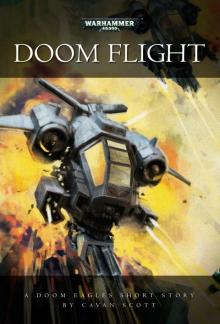 Doom Flight - Cavan Scott
Doom Flight - Cavan Scott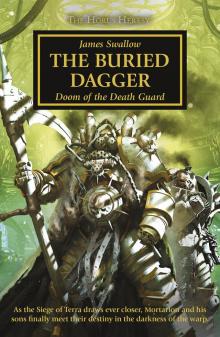 The Buried Dagger - James Swallow
The Buried Dagger - James Swallow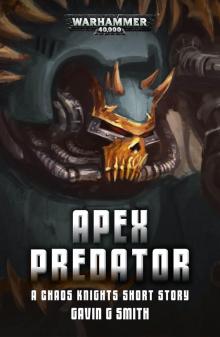 Apex Predator - Gavin G Smith
Apex Predator - Gavin G Smith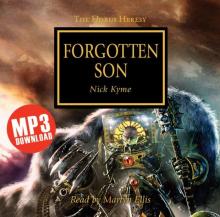 Forgotten Sons - Nick Kyme
Forgotten Sons - Nick Kyme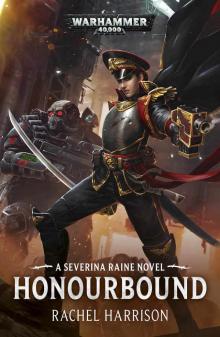 Honourbound - Rachel Harrison
Honourbound - Rachel Harrison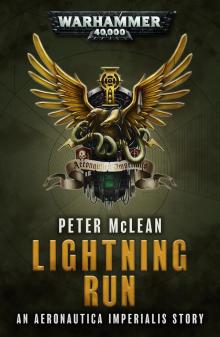 Lightning Run - Peter McLean
Lightning Run - Peter McLean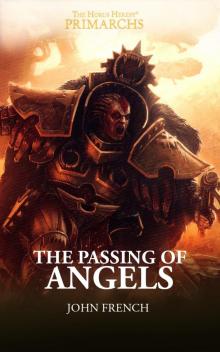 The Passing of Angels - John French
The Passing of Angels - John French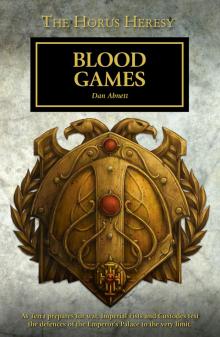 Blood Games - Dan Abnett
Blood Games - Dan Abnett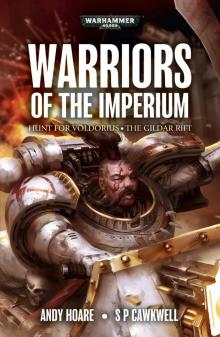 Warriors of the Imperium - Andy Hoare & S P Cawkwell
Warriors of the Imperium - Andy Hoare & S P Cawkwell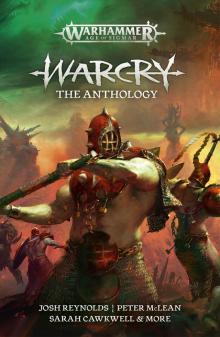 Warcry
Warcry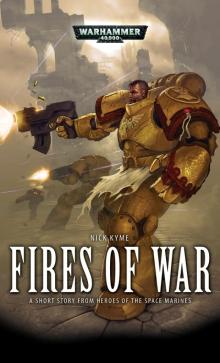 Fires of War - Nick Kyme
Fires of War - Nick Kyme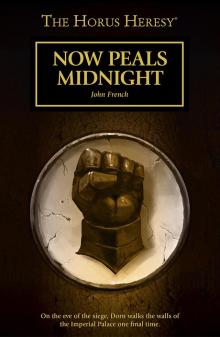 Now Peals Midnight - John French
Now Peals Midnight - John French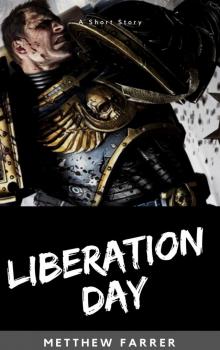 Liberation Day - Matthew Farrer
Liberation Day - Matthew Farrer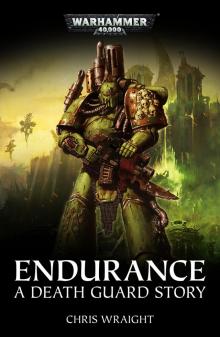 Endurance - Chris Wraight
Endurance - Chris Wraight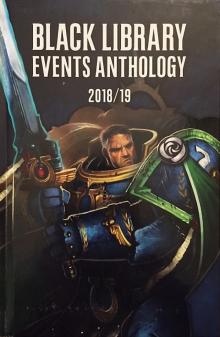 Black Library Events Anthology 2018-19
Black Library Events Anthology 2018-19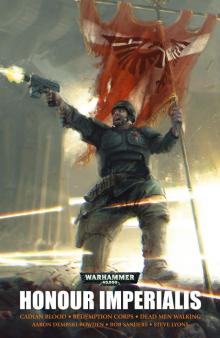 Honour Imperialis - Braden Campbell & Aaron Dembski-Bowden & Chris Dows & Steve Lyons & Rob Sanders
Honour Imperialis - Braden Campbell & Aaron Dembski-Bowden & Chris Dows & Steve Lyons & Rob Sanders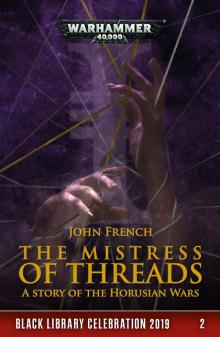 The Mistress of Threads - John French
The Mistress of Threads - John French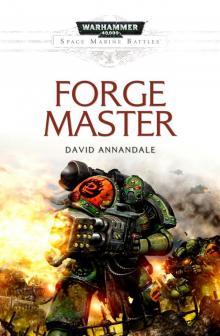 Forge Master - David Annandale
Forge Master - David Annandale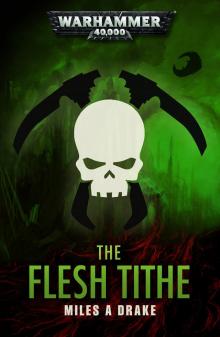 The Flesh Tithe - Miles A Drake
The Flesh Tithe - Miles A Drake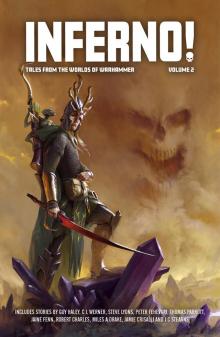 Inferno Volume 2 - Guy Haley
Inferno Volume 2 - Guy Haley Mercy of the Dragon - Nick Kyme
Mercy of the Dragon - Nick Kyme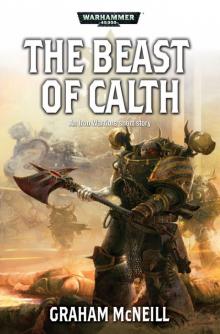 The Beast of Calth - Graham McNeill
The Beast of Calth - Graham McNeill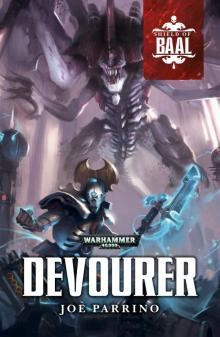 Devourer - Joe Parrino
Devourer - Joe Parrino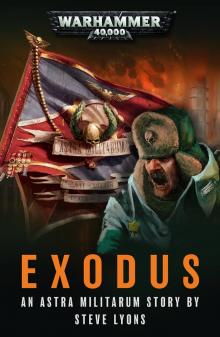 Exodus - Steve Lyons
Exodus - Steve Lyons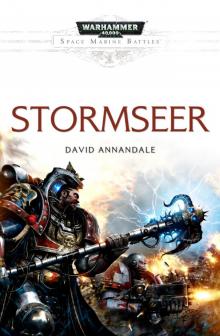 Stormseer - David Annandale
Stormseer - David Annandale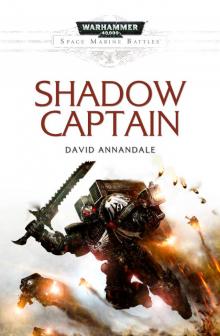 Shadow Captain - David Annandale
Shadow Captain - David Annandale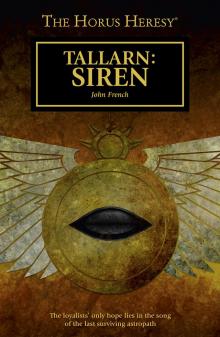 Tallarn- Siren - John French
Tallarn- Siren - John French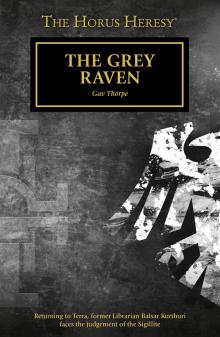 The Grey Raven - Gav Thorpe
The Grey Raven - Gav Thorpe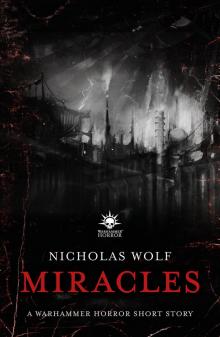 Miracles - Nicholas Wolf
Miracles - Nicholas Wolf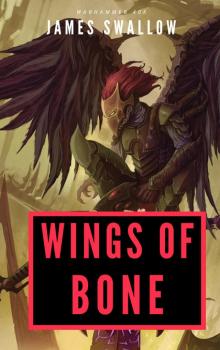 Wings of Bone - James Swallow
Wings of Bone - James Swallow